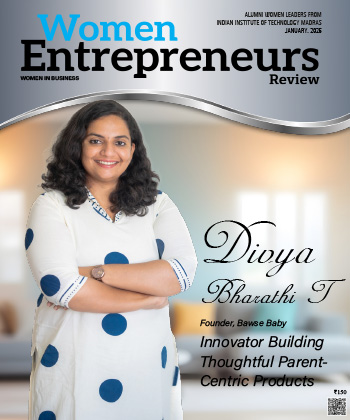
HR Expert on Building an Engaged & Driven Workforce in Insurance
By: Zeenat Burji, Head of HR, Munich Re India
Zeenat is a strategic HR leader with over 15 years of experience across Munich Re, EY-Parthenon, BCG, and Condé Nast, specializing in talent strategy, leadership development, DEI, and aligning people priorities with business goals.
In an engaging interaction with Women Entrepreneurs Review Magazine, Zeenat shares her insights as an HR leader in the insurance sector. She outlines strategies to build a dynamic HR culture in the compliance-heavy insurance sector.
Highlighting Munich Re’s talent acquisition policies, Zeenat also makes a strong case for leveraging the L&D function as a strategic partner. She also touches upon key topics such as employee engagement and performance management and future of the workforce strategy.
To know more about Zeenat Burji’s HR playbook, read the interview below.
How do you balance compliance with fostering an agile and innovative HR culture?
In the insurance sector, compliance is non-negotiable. At Munich Re we have agile HR practices that are compliant yet flexible enough to adapt to evolving business needs. For example, agile talent reviews, flexible work policies, and streamlined approval processes help drive speed without compromising compliance.
With talent acquisition becoming increasingly competitive, what emerging strategies or technologies do you see as game-changers for attracting and retaining top talent in the insurance sector?
In the highly competitive insurance talent landscape, artificial intelligence (AI) and data-driven recruitment platforms are changing the game.
Companies that offer hyper-personalized candidate experiences and leverage internal talent mobility through AI-driven career marketplaces are better positioned to attract and retain top talent. Employee advocacy programs on platforms like LinkedIn also play a key role, as candidates increasingly trust peer reviews over corporate branding. Additionally, offering flexible career paths, cross-industry hiring, and gig roles attract diverse profiles not traditionally seen in insurance.
At Munich Re, we emphasize purpose, DEI (Diversity, Equity, Inclusion), and learning opportunities over job security alone. A big asset for us is also the fact that we empower our teams on the ground and give them strong mandates to act instead of just letting them execute orders from the headquarter.
What is especially important to me is to foster a diverse, inclusive and agile culture that promotes collaboration and knowledge-sharing between units and markets. At Munich Re, we provide opportunities for global mobility which is highly recognized by our talent. We actively support cross-learning and career development. My job at HR is not done once the work contract with an applicant is signed – it is just beginning.
How is Learning and Development’s role evolving to prepare employees for the rapid technological changes and digital disruptions impacting the insurance industry?
Learning and Development (L&D) in insurance is moving from periodic classroom training to continuous, digital-first learning ecosystems. As digital disruption accelerates, employees need rapid, bite-sized learning on emerging technologies like AI, automation, and data analytics. Self-paced learning platforms, micro learning apps, and simulation-based training are becoming mainstream.
Beyond technical upskilling, L&D now emphasizes leadership in digital transformation, change management, and agile working methods. Collaboration with cross-industry partners for immersive learning experiences is also growing.
The L&D function is evolving into a strategic partner, driving workforce transformation agendas and future-ready skill building, rather than simply delivering training programs. Ultimately, learning agility becomes a core organizational capability.
What innovative approaches have you found effective in creating authentic employee engagement and a sense of purpose among employees?
Our purpose is business-model inherent: we help mankind to act braver and better by taking risks – from illness, to accidents, to natural catastrophes and cyber-attacks – from the shoulders of individuals and corporates so that they can focus on what really matters to them.
On top, we initiate purpose-driven projects where employees contribute to community impact or sustainability goals to foster a deeper sense of belonging.
Authentic employee engagement in insurance firms requires moving beyond events and recognition programs. What works is creating platforms for open dialogue, employee voice, and ownership. Hybrid work models with flexibility and well-being initiatives demonstrate care beyond productivity. Leadership visibility and informal forums, where leaders share personal stories and struggles, build trust.
These initiatives help employees see themselves as co-owners of the company’s journey, not just participants in corporate processes. Creating meaning at work, not perks, drives true engagement.
How can insurance companies integrate performance management to motivate employees?
In fast-paced environments like insurance, annual performance reviews alone are insufficient. Embedding continuous feedback through regular one-on-ones and real-time recognition helps keep employees motivated and aligned.
At Munich Re, Managers get trained to act as coaches rather than evaluators, focusing on strengths and development rather than just outcomes. Digital platforms now allow instant feedback loops and peer recognition, making feedback timely and less intimidating.
Which key HR insights do you believe will shape the future of workforce strategy over the next five years?
When I started working in HR 15 years ago, physical office presence was a requirement, no matter the role or the industry. There was no concept of “Working remotely/ Working from Home”. We didn’t think of that single parent, people with long commutes, or those who simply worked better independently could thrive in a different setup.
Thanks to Covid, we not only have this concept but lack of flex work would result in disengagement, attrition, and a failure to attract top talent who are demanding flexibility. Our minimum standard is to ensure we have a hybrid work model with clarity on when to be together and when to work remotely—balancing trust with accountability.
Most Viewed
- 1 Women's Health Startup HerMD Closing Doors Amid Industry Challenges
- 2 5 Famous Women in Indian Armed Forces
- 3 Saudi Women No longer Require Male Permission for Clothing Choices, says Prince MbS
- 4 Kolkata Medtech Startup Innovodigm Raises Rs 5.5 Crore Seed Funding Led by IAN Group
- 5 Yamunanagar's Kashish Kalra Honoured after Securing 111th Rank in UPSC Civil Services Exam
- 6 Madurai Appoints Its First Woman Corporation Head
- 7 IAS Vijayalakshmi Bidari Appointed as the new Nagpur Divisional Commissioner
- 8 American Entrepreneur Lucy Guo Overtakes T Swift to become Youngest Female Billionaire
- 9 ICC Women's World Cup 2025 Trophy Showcased at Indore's Holkar Stadium
- 10 Aparna Saxena's Beauty Venture AntiNorm Launches in India
- 11 Vidya Nataraj Co-Founded BlueStone Jewellery & Lifestyle files IPO
- 12 5 Women Freedom Fighters of India
- 13 Dr. G Krishnapriya appointed as CEO for Trichy
- 14 M3M & Sirona Partner to Introduce Menstrual Hygiene Vending Machines in 15 Locations
- 15 Punjab Govt launches SHE Cohort 3.0 Supporting Tech-led Women Startups
- 16 Indian origin Lawyer, Sweena Pannu appointed as the US New Superior Court Judge
- 17 The Aurora Tech Award recognizes 4 Indian Women-led Startups
- 18 Kerala's Republic Day parade featured an all-female tableau
- 19 Manisha Kabbur Becomes Karnataka's First Woman International Karate Coach
- 20 Director K. S. Ravikumar's Daughter Maalica Ravikumar Launches Life Coaching Company 'Evergrowth Academy' for Women
- 21 Leezu's Raises Pre-Seed Funding to Accelerate Growth in Sexual Wellness Industry
- 22 Sattu: Super-easy summer drink for PCOS gut healing
- 23 Swathi Nelabhatla creates Sitha App, India's First Women-Exclusive Gig Platform
- 24 7 Timeless Female Kathak Dancers & their Iconic Legacies
- 25 Meet 7 Iconic Women Architects of Modern India & their Most Impactful Work
- 26 This Woman-led Insuretech Startup is Helping Bridge the Education Financing Gap in India
- 27 Women Leaders Share Lessons Learnt from India Women's WC Win
- 28 5 Enterprising Women Founders Powering Singapore's Tech & Innovation Landscape
- 29 4 Women. 4 Stories. One Vision for Smarter, Stronger Healthcare
- 30 Global Gender Gap Narrows to 68.8%, But Full Equality 123 Years Away: WEF Report 2025
- 31 Changemakers: 7 Women Entrepreneurs Taking the Make in India Movement Forward
- 32 Meet Lucy Guo, The Youngest Self-Made Female Billionaire Disrupting Tech
- 33 How Women are Driving India's Festive Online Shopping Surge






